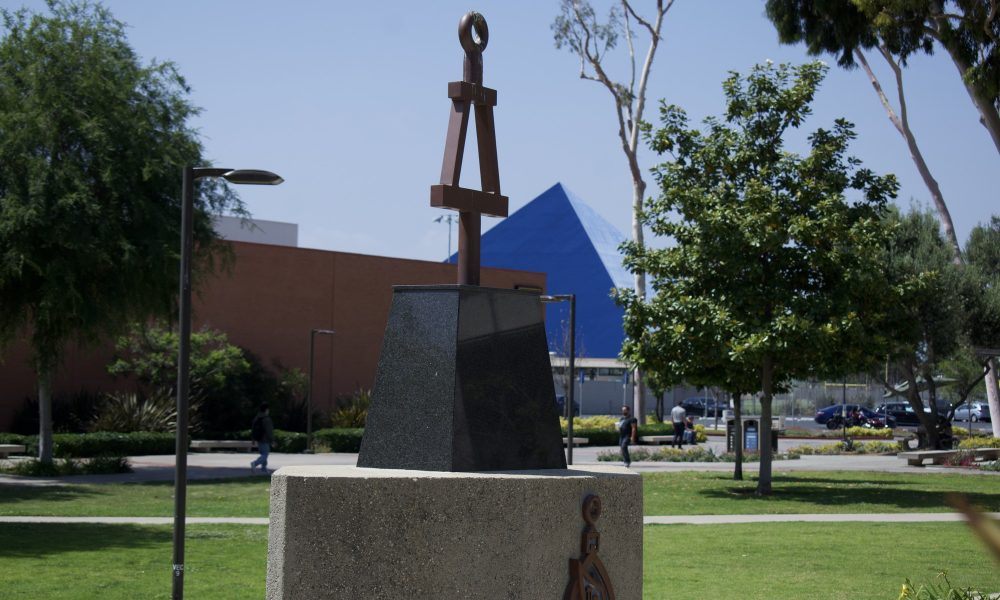Long Beach State computer science students continue to insist they are innocent after they were accused of cheating in their CECS 328: Data Structures and Algorithms, course during the online 2021 Fall semester.
Out of the approximately 50 students who are accused of cheating 13 are attempting to appeal their grade. The students argue that since each student had the same level of instruction and the same assignment, it is coincidence that their codes were similar.
CSULB students and computer science majors Mark Fastner, Isaac Rodriguez and Francis Tran are some of the students accused of academic dishonesty, but insist they completed the assignment themselves.
The long appeals process has affected the students mentally and financially, as the course is a prerequisite to enroll in other courses for their major.
Due to these issues Tran has decided to pursue his degree at another university. Rodriguez plans to retake the course with a fee waiver, but the count of academic dishonesty will remain on his record.
Fastner continues to argue his innocence.
The Situation
After submitting their first algorithm assignment approximately 50 students were accused of plagiarism or collaboration, a violation of their course syllabus stating “under no circumstances can you collaborate with anyone else regarding the programming assignments.”
The class is a prerequisite to enroll in other courses for their major, and has caused the students’ graduation delays along with financial burden.
The course professors, Professor Darin Goldstein and Professor Ali Sharifian, gave an “F” in the course to students who were flagged.
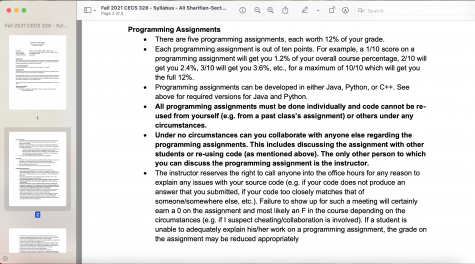
As Fastner, Rodriguez argue that they did not collaborate with anyone.
“Last semester was online for CS majors,” Tran said. “To this day, I still don’t know who that student is that has [a] similar code to mine. There’s no way I can actually meet people in my class and socialize.”
Fastner said similarities occurred because each student in the course was given the same “Coin Stacking” programming assignment, and there was very little room for creativity.
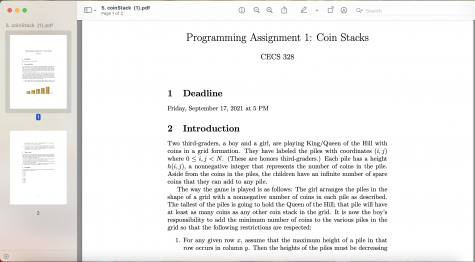

“It’s asking ‘given the specific parameters, add coins,’ so everybody does that. There’s no creativity involved,” Fastner said. “it’s very specific. Like, ‘find the maximum number in the row?’ There’s not a lot of ways to find the maximum number in a row.”
Tran and Rodriguez also reasoned as to why their codes came out similar to other students’.
College of Engineering computer science chair Dr. Mehrdad Aliasgari, said their argument would not cause similarities to occur in their codes.
“When a person writes an essay, they write it in their own style,” Aliasgari said. “People have their own way of expressing their opinion, even if it’s the same. So programming is not that different, either, in that sense.”
The Appeal Process
To appeal their grade, students who were accused of plagiarism are told they need to speak to their professor first and provide a reasonable explanation.
The codes are run through an A.I. [artificial intelligence] that identifies if the students’ code is similar to another. Then four coding experts examine the algorithm to confirm the A.I.’s findings.
If the professor refuses, students appeal their grade to the academic integrity committee. The committee conducts an investigation and sends their opinion on whether or not cheating occurred to the professor, who makes the final decision.
Students then appeal their grade to their department grade appeals committee. If they determine there was no bias in the grading, students can appeal to the college grade appeal committee.
The final level of appeal in the university grade appeal committee.
As the three students try to appeal their grade, they are met with issues arguing their side or presenting their evidence of originality.
“I met with professor Sharifian and he showed the code side by side in the meeting. It was more of a formality for him than providing a state for a student to explain themselves,” Rodriguez said. “I attempted to explain myself and he said, in a short form, that it didn’t matter and that he was going to still do what he had to.”
Tran also had professor Sharifian, and was met with similar results when trying to present his side.
Fastner had professor Goldstein and emailed him to ask what the issues were with his code and which parts were similar. Dr. Antonella Sciortino, the Associate Dean Academic Programs (Interim )answered Fastner on professor Goldstein’s behalf.
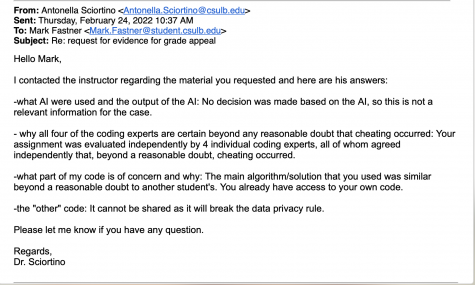
Professor’s Response
In professor Goldstein’s letter to the AIC he believes Fastner plagiarized, he said it does not matter if the students did the work themselves since his syllabus does not define cheating by who did the work.

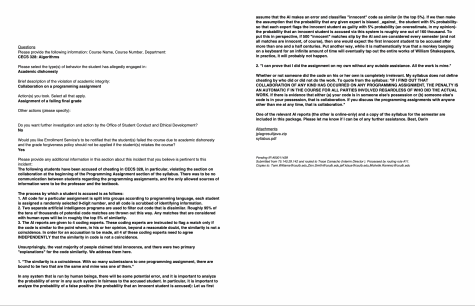
Professor Sharifian’s letter to the AIC was an exact copy of professor Goldstein’s.
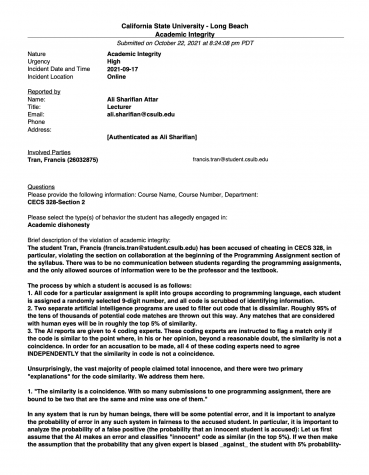
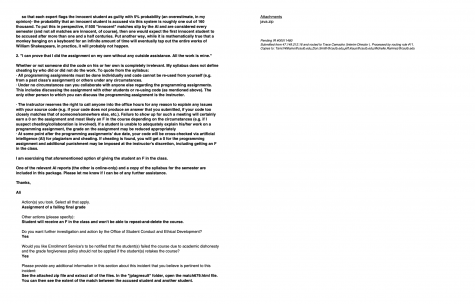
Professor Sharifian’s letter to the AIC was an exact copy of professor Goldstein’s. In his letter, professor Goldstein also emphasized the accuracy of the A.I. system and said there was only a 5% chance of error.
Fastner also provided evidence to the AIC including a copy of his code, but they sided with Goldstein.
Fastner said he was angered by the AIC’s process, sending the same letter to each student they accused of cheating and not being specific to his case or citing his evidence.
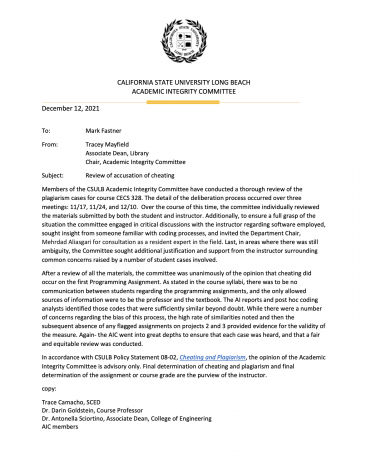
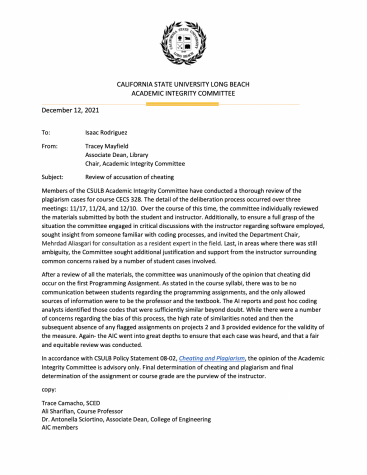
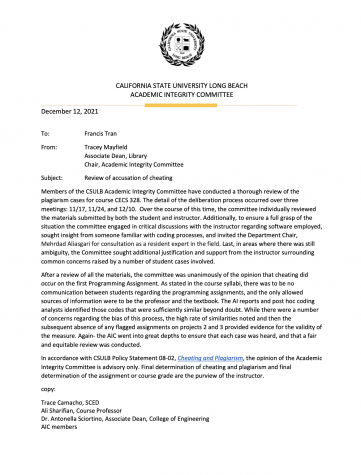
While Fastner and Rodriguez are trying to appeal to the department grade appeal committee, chairperson Dr. Min He, said the committee does not have the power to overturn a grade.
“Our job is to evaluate if the process is fair or not, or if it shows prejudice or not,” Dr. He said. “So from this process, we couldn’t find where the instructor is using bias to give grades to students.
The Impact
The 13 students accused of cheating continue to wait in the appeals process.
Fastner continues to go through the appeals process, and reported that a smaller number of students turned in assignments for the rest of the Fall ’21 semester for fear of getting accused of cheating.
Rodriguez was offered an opportunity to retake the course during the summer with a fee waiver, however the accusation of cheating would remain on his record.
Tran has decided to pursue his degree in computer sciences elsewhere.
They shared that their fellow classmates are having trouble financially and mentally, as the ‘F’ is postponing their graduation day and as they argue their innocence.
There are discussions between the other accused students of staging a protest or pursuing legal action, but no formal plans have taken place.

